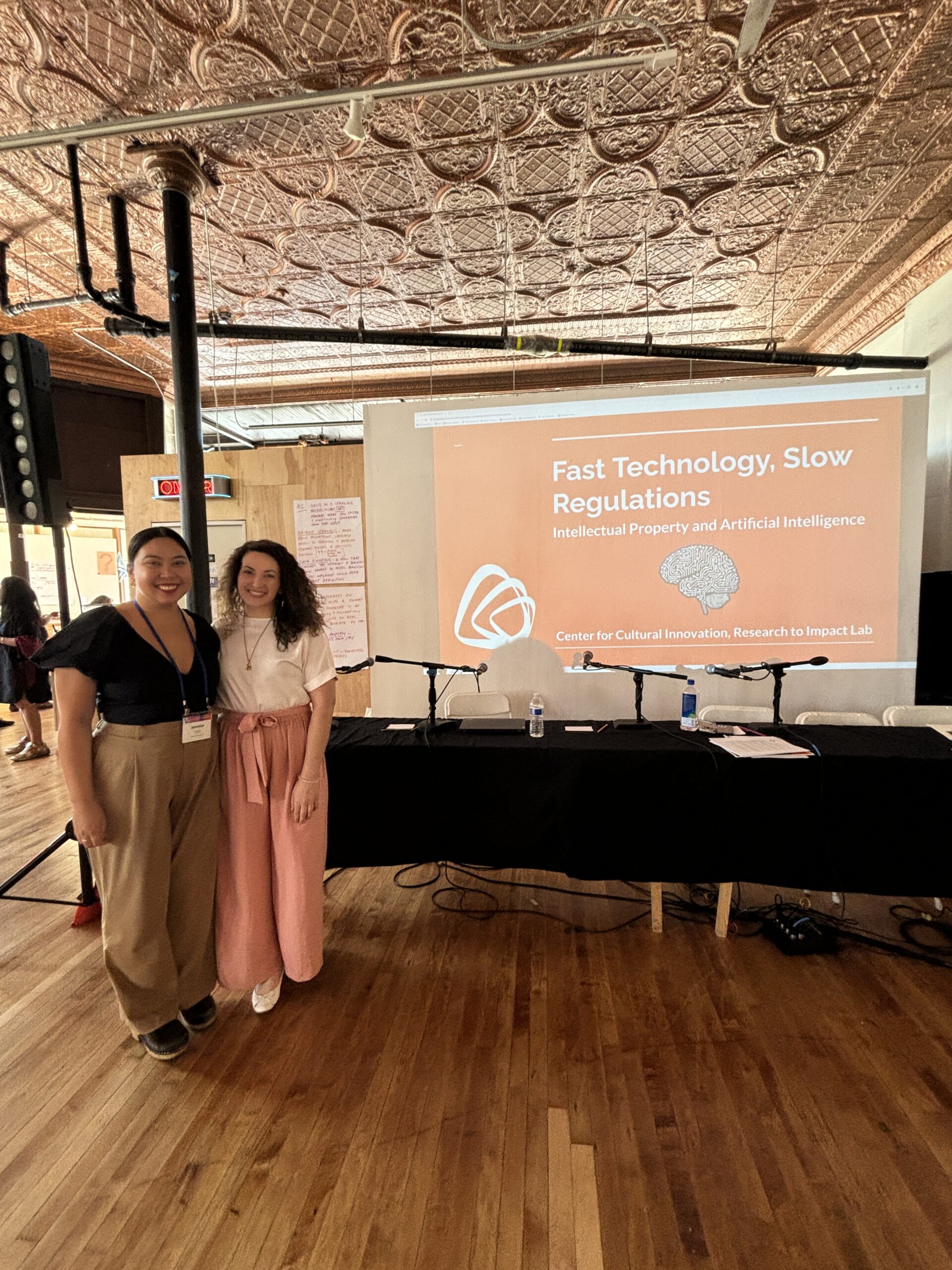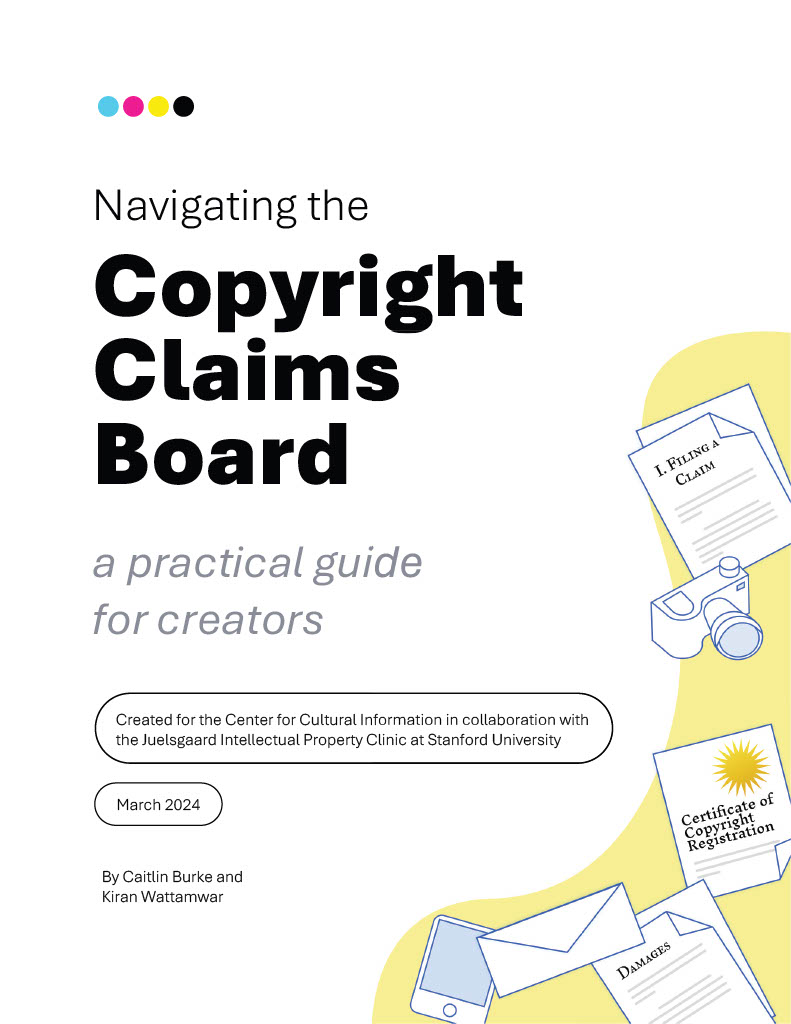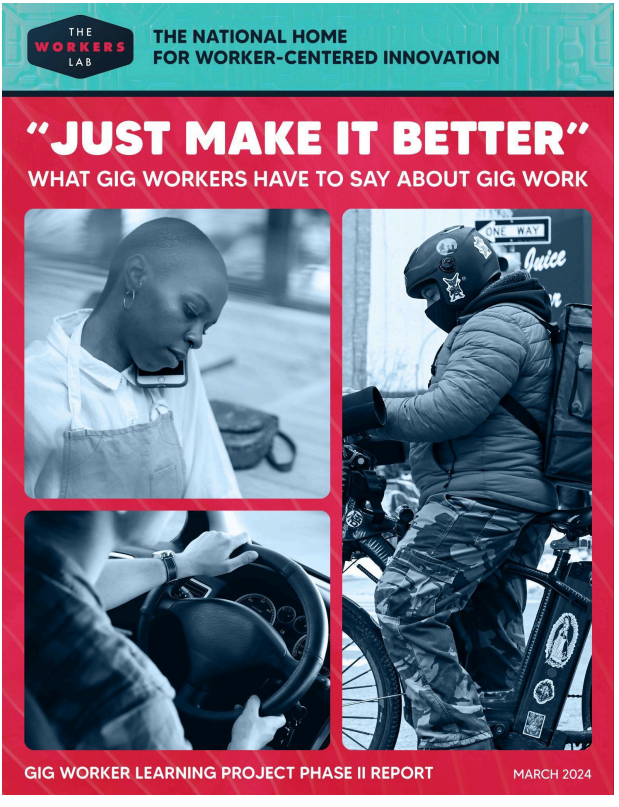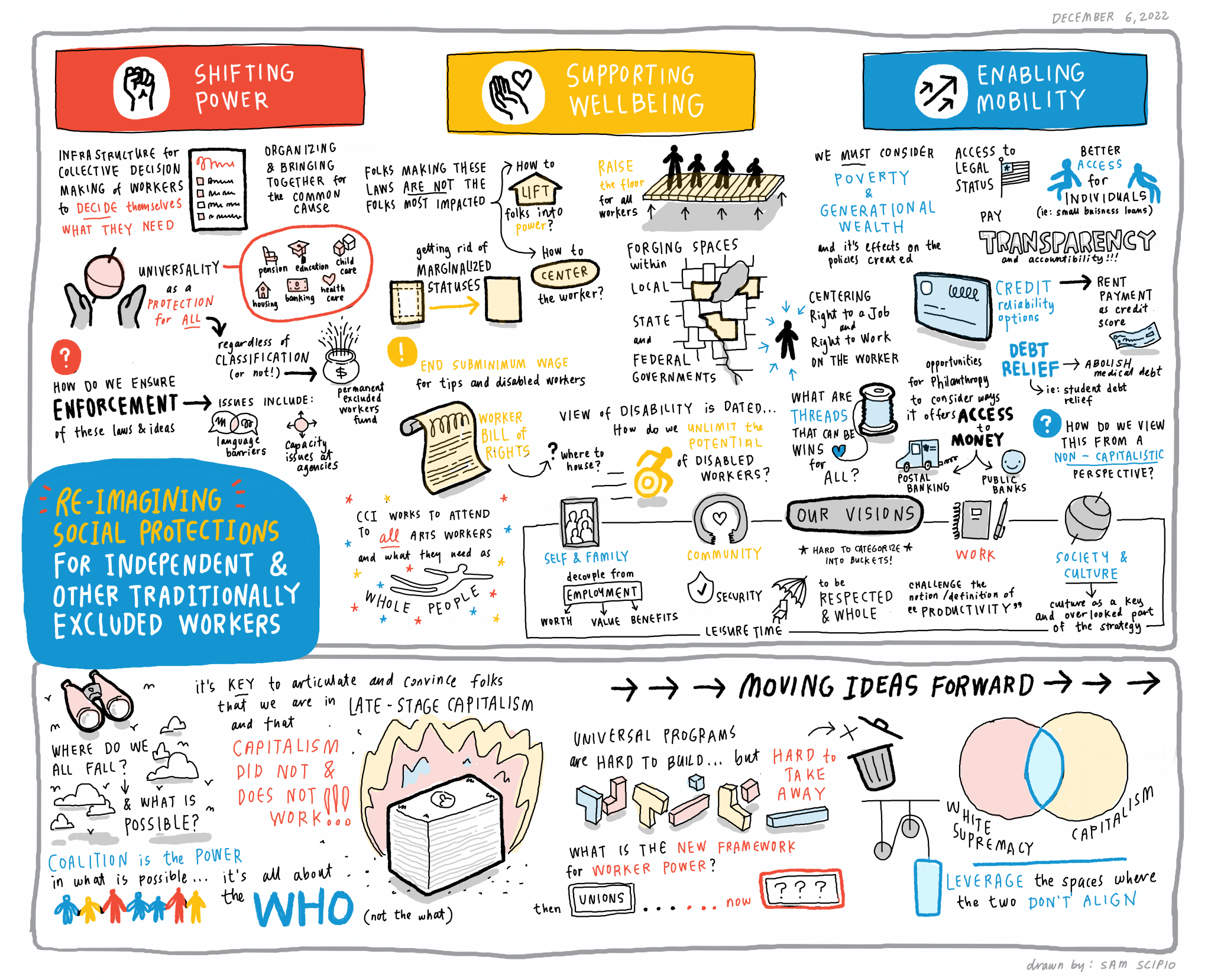Learnings and Ethical Considerations: A Resource for Arts Funders on Artificial Intelligence
Learnings and Ethical Considerations: A Resource for Arts Funders on Artificial Intelligence
A helpful resource for funders interested in moving ethically in the Artificial Intelligence (AI) space
As Artificial Intelligence (“AI”) transforms various sectors, it is crucial to evaluate both the pros and cons of AI-integrated projects. As arts’ funders, it is our duty to safeguard human creativity, ownership rights, and data privacy for creators and cultural communities in grantmaking processes.
Research to Impact Lab staff designed a workshop for the 2024 Grantmakers in the Arts' Support for Individual Artists Preconference: The Future is AI? Equipping Artists for the Digital Renaissance.
The R2I Lab’s workshop, Fast Technology, Slow Regulations: Intellectual Property and Artificial Intelligence, featured a discussion on current AI regulations as well as the ethical and social implications amid rapid technology adoption and limited data protection measures.
The workshop featured tangible and immediate protections that funders can support to address artists' intellectual property concerns and offered strategic possibilities for funders interested in supporting more structural changes impacting individual artists and vulnerable communities.
The workshop finished with a hands-on activity where funders could practice intentional discovery and due diligence on a project involving AI technology.
This resource expands on the workshop content, providing a comprehensive list of due diligence questions and implementation strategies for arts funders evaluating AI-integrated project proposals.
Navigating the Copyright Claims Board: A Practical Guide for Creators
Navigating the Copyright Claims Board: A Practical Guide for Creators
A guide for creatives to better understand the Copyright Claims Board (CCB). This resource was created through a partnership between The Center for Cultural Innovation (CCI) and Stanford University's Juelsgaard Intellectual Property and Innovation Clinic (JIPIC)
Thank you so much for sharing your story! We will use these examples to shape our advocacy, research, and resources on this topic, and may reach out to you for more information, or to let you know about opportunities to advance social and economic protections for all.
Navigating the Copyright Claims Board: A Practical Guide for Creators would not have been possible without the support of the William & Flora Hewlett Foundation and the Kenneth Rainin Foundation
Supporting Confident Creativity
Stanford and CCI Partner to Help Creatives with their Copyright Claims
For the vast majority of artists, some interaction with technology is not only unavoidable - it is necessary to rapidly create, produce and disseminate work as well as to ensure compensation. From blockchain to NFTs to Etsy, creatives use technology to connect directly with those who support their artwork. However, such technologies have also made it incredibly easy for that artwork to be pirated or misattributed. To protect their livelihoods, artists must learn how to protect their work from copyright infringement, as well as other lesser-known copyright claims that can impact an artist’s livelihood such as noninfringement and misrepresentation. The Copyright Claims Board (CCB) was created to make this process easier and less expensive for the average creator.
The Copyright Claims Board (CCB) was established in 2020 by Congress to answer an urgent need - the large volume of copyright claims and the limited amount of resources (time, expertise, money) available to creators to make those claims in federal court. The CCB consists of an entirely online process led by a three-member tribunal with extensive expertise in copyright law. The goal is a more efficient, less expensive alternative to federal court for copyright claims of less than $30,000.
And yet, like any bureaucratic process, this one can be challenging for those without an understanding of intellectual property law. CCI felt that it was critical to create a resource specifically for creatives so that they might learn how to navigate the CCB to protect their intellectual property rights. Through a partnership with the incredible students and staff of Stanford University’s Juelsgaard Intellectual Property and Innovation Clinics, we have created a live online resource for creatives to confidently navigate the CCB called Navigating the Copyright Claims Board: A Practical Guide for Creators!
What makes Navigating the Copyright Claims Board: A Practical Guide for Creators so special? Our Juelsgaard Clinic students found that since opening, the CCB has only seen a success rate of 1.5% of claims reaching a final decision (that is only 12 claims out of 721 filed).
This jaw-dropping number sparked our interest - how is it possible that a public resource set up to encourage independent creatives to take control of their IP should see such a dismal success rate? Our hope is that with this more accessible and interactive guide, artists and creative workers will feel more confident in their copyright claims.
To celebrate the release of this resource, please join us for the following activities:
-
- Confidently Informed: Navigating the Copyright Claims Board for Creatives on Thursday, June 6: a virtual workshop with the authors of the resource, Caitlin Cary Burke, Juelsgaard Clinic Member, Stanford J.D/PhD Candidate, 2025; and Kiran Wattamwar, Juelsgaard Clinic Member, Stanford J.D Candidate, 2025. Participants will get a tour of the guide and the chance to ask its authors any questions they might have about copyright protections. Register here!
- Confidently Registered: a Copyright Registration Party! on Thursday, June 20. CCI will host a virtual registration party! Register your copyright online with the Copyright Office. CCI staff will be on hand to assist you through the process. Register here!
- Share Your Story! Are you an artist or creative worker who has dealt with an issue related to copyright? If so, then share your story with us below! We’ll add it to a story bank to help us understand how we can support creatives with their copyright issues.
- Ongoing Activities. CCI will host resources and gatherings related to the needs of artists and in response to the research. Interested in partnering on this initiative? Contact Jennelyn Bailon at jennelyn@cciarts.org
CCI would like to thank the team from Stanford for making this resource possible:
Caitlin Cary Burke, Juelsgaard Clinic Member, Stanford J.D/PhD Candidate, 2025
Kiran Wattamwar, Juelsgaard Clinic Member, Stanford J.D Candidate, 2025
Phil Malone, Director of Juelsgaard Intellectual Property and Innovation Clinic, Mills Legal Clinic, Stanford Law School
Nina Srejovic, Clinical Supervising Attorney and Lecturer, Juelsgaard Intellectual Property and Innovation Clinic
Navigating the Copyright Claims Board: A Practical Guide for Creators would not have been possible without the support of the William & Flora Hewlett Foundation and the Kenneth Rainin Foundation
Gig Worker Learning Project: Phase Two Report
Gig Worker Learning Project: Phase Two Report
"Just Make It Better." What Gig Workers Have to Say About Gig Work
The Gig Worker Learning Project is a valuable resource for anyone seeking to better understand gig workers and the challenges they face.
Supported by CCI, led by The Workers Lab, and developed in collaboration with the Aspen Institute Future of Work Initiative, “Just Make It Better. What Gig Workers Have to Say About Gig Work” is a unique new piece of research on “gig” work, co-authored by active gig workers as participant-researchers. The goal of this project is to better understand gig work and workers directly from gig workers themselves, regarding their motivations, challenges, and solutions that would impact their lives personally and professionally.
Imagining Social Protections for All
Imagining Social Protections for All
Bringing together worker advocates and movement leaders to imagine new systems of protection
Althea Erickson
Althea Erickson is the Director of the Sol Center for Liberated Work, a program of the Center for Cultural Innovation. Previously, Althea was the Vice President of Global Government Affairs and Impact at Etsy, and Advocacy & Policy Director at Freelancers Union.
Sometimes when we’re living inside a system, it’s hard to imagine what an alternative could look like.
In our desire to make progress–to improve the way things work–we focus on a tweak here, a shift in implementation there. And to some extent, that can be a good and pragmatic strategy. But it has its downsides.
When we seek to fix the systems we live in, we may unintentionally reinforce and entrench ones that simply don’t work, and worse, undermine our hope of achieving more. For example, the U.S. social safety net excludes huge swaths of workers–domestic workers, farm workers, self-employed workers, sex workers, and undocumented workers, just to name a few. Some of these groups were explicitly excluded to appease Southern segregationists, while others were merely overlooked due to the nature of the economy at the time. To date, much of the effort to close those gaps has been to focused on expanding existing systems to new populations, for example including domestic workers in labor laws or excluded workers in unemployment insurance. But what if the 21st century work force simply doesn’t fit into 20th century systems?
What if we started fresh, and reimagined a set of social and economic protections that met the needs of today’s workforce, unencumbered by the past? And what if we started that conversation with the workers who have been erased from the conversation, yet are most excluded from today’s safety net? What types of protections might we imagine together? And wouldn’t that system be more likely to actually work for all?
Those questions underpinned Reimagining Social Protections for Independent and Other Traditionally Excluded Workers, a convening we co-hosted with the Urban Institute in December 2022. The convening brought together worker advocates representing nontraditional workers from across a wide swath of sectors–domestic workers, migrant workers, temp workers, street vendors, migrant workers, sex workers, and more. Together, we set aside the constraints of today’s systems, and gave ourselves permission to imagine an alternative vision of economic security for today’s workforce, to dream beyond barriers of all kinds.
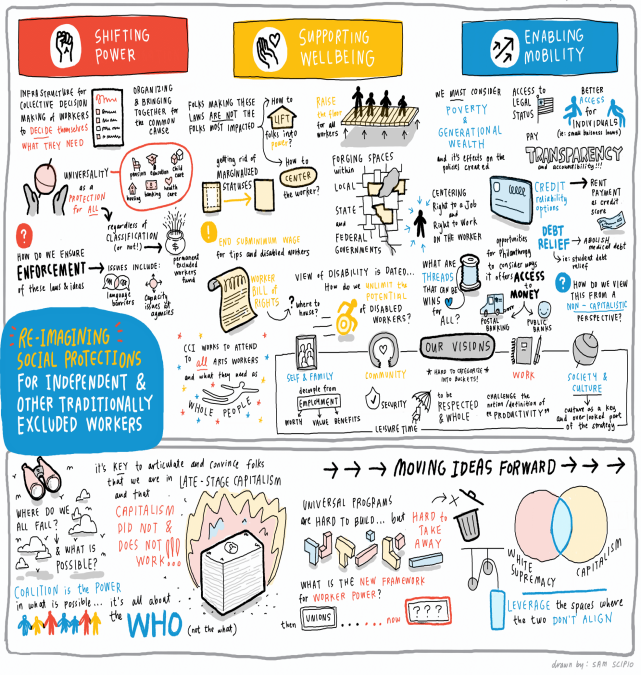
The ideas that garnered widespread support were pretty inspiring, and start to paint the picture, and the true possibility, of an alternative system of protections that isn’t contingent on your specific job or identity as a worker, but is guaranteed to you, as a human. In particular, attendees imagined:
-
-
- Widespread adoption of guaranteed income and other cash transfer programs that offer a floor of protections for all workers regardless of employment status
-
- Improvement of key social insurance programs, including healthcare, unemployment insurance, and retirement to make them affordable, portable, and universally available to everyone, regardless of their employment status
-
- The establishment of a national worker bill of rights that would apply to all workers, regardless of sector, occupation, or employment status
-
- Robust enforcement of labor laws and worker protections across all sectors
- Exploration of new models for building and wielding collective power, like sectoral bargaining
-
Driving the discussion were some core ideas – and really cultural and narrative shifts – that we, as a society, need to grapple with.
-
-
- We need to decouple work from worth.
-
- All people deserve dignity.
-
- We are full humans deserving support, not just in the narrow confines of our identities as workers.
-
- Our labor is more than the labor we do to earn income. It is the labor we do to support our families, to strengthen our communities, and to express ourselves that makes life worth living.
- A just society recognizes the value of people as humans, and builds systems to support broader human flourishing.
-
As inspiring as the visioning was, at times participants raised the challenges that stand in the way of moving from the systems we have to the systems we want, especially given the current political forces shaping policy today. And yet, there was palpable energy in the room around building greater connectivity and connection across these groups, to build greater collective power between and among nontraditional workers across sectors.
Yes, the challenges are great, but if we can align ourselves around a shared vision, we can start to build bridges to get from here to there.
You can read the full summary of the convening here. We, of course, welcome your voice in this ongoing conversation.
Convening Summary: Reimagining Social Protections For All
Convening Summary: Reimagining Social Protections For All
A Summary of the Virtual Convening on Reimagining Social Protections for Independent and Other Traditionally Excluded Workers
This December 2022 convening brought worker advocates and movement leaders together to reimagine social protections for all.
This summary describes the discussions at a virtual convening titled “Reimagining Social Protections for Independent and Other Traditionally Excluded Workers” and includes an artist's live visual notes taken during the event. We collaborated with the Urban Institute to host this convening in December 2022.
During this event, worker advocates, forward thinkers, and movement leaders imagined new systems of worker supports, protections, and power for those excluded from existing benefits and social protections, including independent contractors, temp workers, and workers in the arts.
